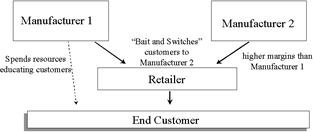When thinking about channels of distribution arrangements one must always remember that the goals of the various firms in the channels may diverge from one another. This is natural since various members are separate firms with distinct business models.
Take, for example, a manufacturer who sells products through a retailer. While a manufacturer is devoted to its own products, a retailer (and other distribution partners like "distributors") typically sells the products of many manufacturers. A manufacturer may want to educate customers about its own product, while the retailer may not want to bear the costs (or have the expertise) to provide product education. In fact, a retailer may simply be interested in pushing the products of any manufacturer that provides the highest margin. This is not surprising because, again, the manufacturer and retailer are separate firms.
As a result of divergent interests between channel partners, various problems can arise that require a manufacturer to think in terms of channel incentives. Let’s think about two of the classic problems: bait and switch and free-riding.
BAIT AND SWITCH
To understand bait and switching, consider the following figure.

Bait and switching occurs because Manufacturer 1 spends resources educating customers about a product category while Manufacturer 2 does not. This education effort is costly and can result in lower margins for the retailer. After all, it’s Manufacturer 1 who is pulling in the customers via the education effort, so why give the retailer a big margin. But sine Manufacturer 2 isn’t involved in educating the market (but gets some benefit, especially due to greater awareness about the product category) can provide a higher margin to the retailer than Manufacturer 1. So what happens? The retailer has an incentive to use Manufacturer 1’s product as the bait (i.e., to attract customers), but then push Manufacturer 2’s product once the customer comes in the store (the switch).
FREE-RIDING
Free-riding involves earning profits on the efforts of others. For example, consider a customer segment the cares about the benefit "before-sales service" and a channel arrangement where retailers provide that service.
Free-riding occurs when one retailer decides to lower the service they provide to the segment. In many situations the retailer may have an incentive to do this if it perceives it can make more money, even at the expense of others. More money can come from drawing in another "price-sensitive" segment and even providing a way for customers who value service to obtain that service and the product at a lower price (they simply get the service from a retailer who provides it, and purchases the product from the free-rider)
If free-riding is allowed to continue, all retailers will have an incentive to stop providing before-sales service. The manufacturer will be harmed and customers who want before-sales service will not get it.
Because of bait and switching and free riding, manufacturers place restrictions retailers and other distributors to provide specific incentives. These restrictions and incentives are intended to eliminate (as much as possible) the incentives of a retailer to engage in behaviors that harm the manufacturer.
You might think that some of the unwanted behavior can be handled with a contract, but so-called "complete contracts" that specify all unwanted behavior are difficult if not impossible to write and enforce. Instead, we look for what economists call an "implicit contract" or a "self-enforcing agreement". As the name implies, these "agreements" are set up so that the retailer, acting its own best interest, does what’s best for the manufacturer.
SOLUTIONS
Let’s look at some of actions a manufacturer might take (continuing with our example of "service" as the desired benefit by customers).
Offer to subsidize specific services (e.g., by providing coop advertising)that a retailer provides for the manufacturer’s products. This subsidy goes only to those retailers who provide the specific service. Retailers who don't provide this service are not given the subsidy.
Monitoring so that retailers know that you are able to find out the level of , say, service they are providing. This is a mechanism widely used in the franchise industry to maintain required levels of service and food "quality".
Assigning retailers exclusive territories (i.e., assigning one retailer in a geographic region) is a mechanism that reduces customer’s ability to free-ride and increases retailers incentives to maintain service levels. The Internet creates havoc with this mechanism as geography becomes a meaningless concept.
In cases where other mechanisms cannot provide the proper incentive, extreme solutions involve the manufacturer providing the service itself. This could be via vertical integration (a very extreme solution) or more complicated agreements between manufacturers and retailers to split the responsibilities of providing service (with a consequent splitting of margins).
If you are interested in this topic, there are some readable books that deal with the incentives of retailers in these contexts. One book I would recommend is by Paul Rubin called "Managing Business Transactions" (see books).




